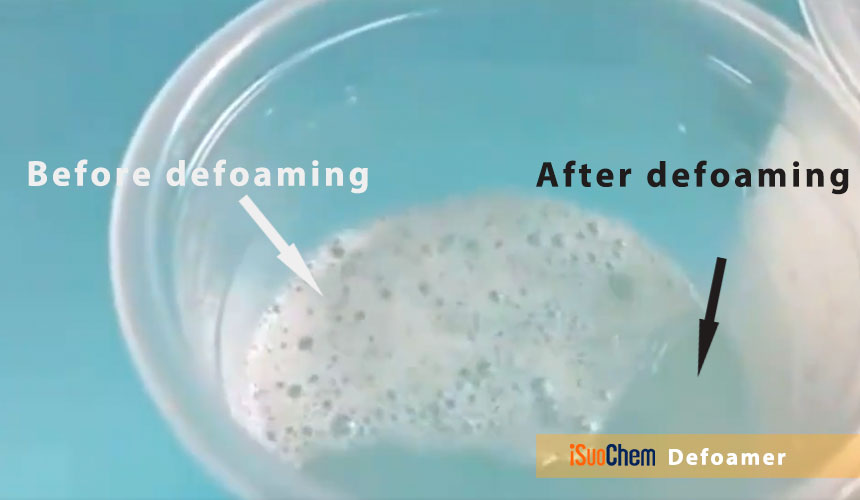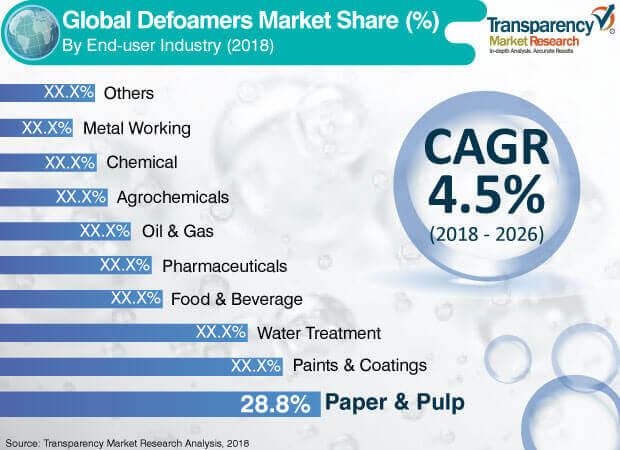Discover the Top Advantages of Utilizing Defoamers in Industrial Processes
The utilization of defoamers in commercial processes offers a variety of engaging benefits that can enhance functional effectiveness and item quality. By properly managing foam manufacturing, these agents not just maximize material circulation but additionally add to substantial cost decreases and improved sustainability. Their application covers several industries, which elevates questions concerning their role in mitigating environmental influence while making sure consistent output. Recognizing these advantages is vital for industries intending to refine their processes. The effects of adopting defoamers may be a lot more profound than at first regarded. What specific advantages could your company harness?
Enhanced Refine Efficiency
Enhancing commercial processes commonly involves addressing frothing problems, which can hinder operational performance. Foam formation can disrupt the appropriate functioning of devices, minimize the efficient use of sources, and make complex the tracking of essential criteria. By applying defoamers, sectors can successfully alleviate these problems, resulting in structured procedures and enhanced productivity.
Defoamers work by destabilizing the foam framework, permitting for fast collapse and considerable reduction in foam volume. This action not only enhances the circulation of products through equipment, such as mixers, pipelines, and activators, however also decreases disturbances triggered by foam overflow. Tools downtime is minimized, allowing for an extra effective and continuous manufacturing process.
In addition, the use of defoamers can bring about minimized energy usage. With less foam to handle, compressors and pumps can run more efficiently, leading to reduced operational prices and an overall renovation in process throughput. Inevitably, the tactical use defoamers not only addresses instant frothing difficulties yet also adds to a more reliable industrial ecological community, fostering an affordable benefit in a demanding market.
Improved Product Top Quality
The integration of defoamers in commercial processes plays a critical role in improving item top quality. By effectively managing foam development, defoamers add to the uniformity and uniformity of end products. Extreme foam can cause oygenation, which negatively impacts the structure and security of solutions, particularly in markets such as food and finishings, pharmaceuticals, and beverages.

Moreover, defoamers promote much better mixing and diffusion of components, leading to homogeneity in solutions. This is vital in applications where precise ingredient proportions are crucial for efficiency and security. Additionally, the removal of foam can reduce the threat of contamination during manufacturing, additional safeguarding item integrity.
Eventually, by improving item quality, defoamers not only boost consumer contentment however additionally strengthen brand reputation. Their duty in maintaining premium requirements underscores their value in modern industrial procedures.
Price Reduction Advantages
Implementing defoamers in industrial procedures can bring about significant expense decrease benefits. By efficiently regulating foam development, defoamers minimize product loss throughout production, thereby optimizing material use. This decrease in waste converts directly into lower resources prices, boosting overall operational efficiency.
Additionally, making use of defoamers can lower power consumption. Excessive foam can impede tools efficiency, leading to enhanced energy demands to keep production levels. By alleviating foam, defoamers promote smoother operations, allowing machinery to run a lot more successfully and reducing energy expenditures.

Additionally, defoamers can shorten handling times. Foam can create additional challenges that prolong manufacturing cycles. By utilizing defoamers, industries can streamline their procedures, bring about faster turn-around times and defoamers enhanced throughput. This effectiveness not only accelerates production but also permits firms to satisfy market demands more promptly.

Environmental Impact Reduction
In industrial procedures, using defoamers plays an essential function in mitigating ecological impacts associated with foam generation. Foam can cause significant functional inefficiencies, leading to increased emissions and waste generation. By efficiently managing foam, defoamers aid keep procedure efficiency, thereby decreasing the general ecological impact of procedures.
In addition, too much foam can overflow containment systems, causing spills that might infect dirt and water sources. Defoamers aid decrease this threat by ensuring that foaming does not exceed recommended restrictions, advertising conformity with environmental guidelines. This positive method not only safeguards environments however likewise improves the sustainability of industrial practices.
Additionally, the usage of defoamers can decrease power usage in you can try this out different processes. defoamers. Decreasing foam formation diminishes the need for added energy-intensive actions, such as boosted anxiety or pumping, which may or else be essential to handle foam. The adoption of defoamers straightens with more comprehensive sustainability objectives by promoting power effectiveness while reducing the carbon impact of commercial tasks.
Eventually, integrating defoamers into commercial operations is a critical action that supports environmental stewardship and liable resource monitoring.
Adaptability Across Industries
Throughout numerous markets, defoamers show exceptional versatility, adjusting to the specific demands of diverse applications. In the food and drink sector, for example, defoamers are vital to preserving product high quality by preventing foam development throughout processing, which can influence texture and taste. In the see this site pharmaceutical industry, defoamers make sure the stability of formulas, boosting item efficacy and uniformity.
In the chemical manufacturing realm, defoamers help with smoother procedures by minimizing foam in reaction vessels, hence boosting yield and minimizing downtime. The paper and pulp sector depends on defoamers to enhance the effectiveness of pulp handling and paper production, guaranteeing optimal item integrity. Furthermore, in wastewater therapy centers, defoamers play an important function in regulating foam throughout oygenation procedures, leading to enhanced treatment outcomes.
The versatility of defoamers encompasses the oil and gas sector, where they help in managing foam in exploration fluids and production procedures. By customizing solutions to fulfill details industry requirements, defoamers act as crucial devices that enhance operational efficiency, product quality, and overall procedure performance throughout a plethora of sectors. Their adaptability emphasizes their value in contemporary industrial applications.
Final Thought
Finally, the application of defoamers in industrial procedures offers many advantages, consisting of boosted efficiency, improved item high quality, significant price decreases, and positive ecological effects. Their ability to effectively regulate foam formation adds to functional continuity and source optimization. Furthermore, the versatility of defoamers throughout diverse markets highlights their critical duty in promoting sustainable methods and earnings. The combination of defoamers represents a calculated strategy to dealing with difficulties related to foam monitoring in numerous producing atmospheres.
Eventually, the critical use of defoamers not only addresses instant frothing obstacles but also contributes to a more effective industrial ecological community, fostering a competitive advantage in a demanding market.
In industrial processes, the use of defoamers plays a crucial role in mitigating environmental impacts associated with foam generation. By efficiently controlling foam, defoamers assist preserve process effectiveness, consequently minimizing the general ecological footprint of operations.
Furthermore, in wastewater treatment facilities, defoamers play a vital role in controlling foam during oygenation procedures, leading to better therapy results.
